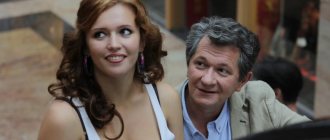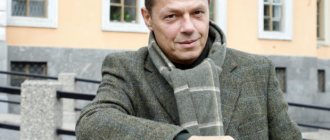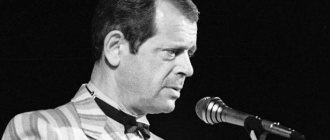Throughout his life he went against everything, and fate was on his side. There was little talk about him on TV or radio, but his creative success captivated Soviet theater and film audiences. Gennady Bortnikov was recognized as Honored and later People's Artist of the Russian Federation. He played on the same stage with F. Ranevskaya, L. Orlova, S. Birman and other famous actors of the Mossovet Theater. Gennady Leonidovich was the idol of many women, but he did not want to tie his life into a family union, he was afraid of being deceived and betrayed.
Family
In 1939, on April 1, a son was born into a Moscow family of a housewife and a military pilot. The boy's father was on the road all the time, and his mother died when the child entered first grade. Gennady was raised by his grandmother.
After graduating from the seven-year school, the boy, on the instructions of his father, entered the mechanical engineering college, but never completed it. A year later he went to work at a factory as a mechanic.
Since childhood, Gennady Bortnikov’s personal life belonged to creativity. He was fond of drawing from school. While the class was writing dictations, the boy reproduced satirical images of students and teachers in his notebook. Bortnikov even entered art school, but his love for theater extinguished his reverent feeling for fine art.
Visit to the monastery
Gennady Bortnikov in an interview constantly mentioned his opposition to others on the path to realizing his interests. So, one day he had a conflict with his father, a man in the military profession, who did not want to see his son as an actor. It was precisely the parental prohibition that formed the young man’s tendency to resist the opinions of others, which grew and subsequently brought Gennady to the theater stage.
However, then Bortnikov expressed his disobedience to his father’s will by running away from home. Instead of the Suvorov School, where Gennady’s father wanted to send him, he fled to the Trinity-Sergius Lavra. His goal was to see the life of church ministers. There, in Zagorsk, he first tried to realize his artistic talent. Gennady began to draw icons. This skill more than once helped the actor earn a piece of bread later, in difficult financial times.
Upon returning home, the young man was punished, but still followed his heart and entered the Moscow Art Theater School.
Personal life
A stately handsome man with a velvety voice, Bortnikov in his youth enjoyed incredible success among fans. They bombarded him with letters with declarations of love, kept watch near the theater, cut out photos from newspapers and hunted for autographs, but Gennady led a secluded life and did not seek to have affairs.
Gennady Bortnikov and his cat
According to friends, he created a shell around himself, into which he did not want to let anyone inside. The artist was afraid of betrayal, worried that those around him valued him only for his popularity and would not stay by his side when the shine of fame faded. He did not like to talk about his novels and carefully protected his personal life from intrusive attention.
Gennady Bortnikov in recent years
Among the beauties around him, he never chose a wife. He also had no children. The only ones who were always close to him were his pets. Bortnikov had a weakness for animals, kept a mongrel cat, Marik, at home and fed stray dogs, for which he carried pockets full of treats.
Theater talent
Gennady Bortnikov discovered his talent for artificial transformation in the role even before starting his studies at the Moscow Art Theater. The mannered behavior of his neighbor's comrades who attended the theater studio encouraged the young man to come to class and see what was being taught there. An educated female teacher, intelligent students and a mysterious atmosphere made Gennady fall in love with this art. He asked to work at the acting studio as a decorator and was hired as a volunteer to design performances.
As fate would have it, Bortnikov was once asked to read Pushkin. Successful recitation took the guy from an artist to an actor. Gennady’s first role was the image of a raven from Marshak’s fairy tale “The Twelve Months.”
Notes[ | ]
- ↑ 123
Russian Drama Theatre: Encyclopedia / Ed. ed. M. I. Andreeva, N. E. Zvenigorodskaya, A. V. Martynova and others - M.: Great Russian Encyclopedia, 2001. - 568 pp.: ill. ISBN 5-85270-167-X - Moscow Art Theater School: 1960—1969 Archived June 29, 2015.
- Gennady Bortnikov - actor, translator, artist (undefined)
. tvkultura.ru. Retrieved January 15, 2020. - (unspecified)
died at the age of 68 . CJSC Publishing House "Komsomolskaya Pravda". Retrieved January 15, 2016. - Farewell: Gennady Bortnikov // Newspaper “SK-news”, No. 4 (234) dated 04/06/2007 - page 17 (inaccessible link)
- The whims of love, or the whims of Marianne (unspecified)
. www.vashdosug.ru. Retrieved January 15, 2020.
The beginning of the stage path
After graduating from evening school, Bortnikov realized his dream and entered the Moscow Art Theater studio for the course of A.K. Tarasova.
At the end of his studies (1962), during final exams, the role of the ugly and poor Tuzenbach from Chekhov's classics was played by a charming student Gennady Bortnikov, a photo of the young actor demonstrates his skill. The guy’s talent was noticed by the director and actress of the Mossovet Theater I.S. Anisimova-Wulf. She organized a meeting between Gennady and the chief director of the drama theater Yu.A. Zavadsky, a man who became the actor’s guiding star.
His graduation performance was also appreciated by figures from other theaters (Sovremennik, Moscow Art Theater) and offered work at their place, but Gennady Leonidovich chose the Mossovet. At that time, Lyubov Orlova, Serafima Birman, Nikolai Mordvinov, Faina Ranevskaya worked there. These great people, when Bortnikov began working in the theater, received him with great love and supported the young talent.
Creation
Teachers noticed his outstanding talent already in his first year. In his graduation performance, Bortnikov brilliantly embodied the image of Tuzenbach from Chekhov's Three Sisters. At the school he met the famous director Yuri Zavadsky. After graduation, Gennady is invited to Sovremennik, but he makes a choice in favor of the Mossovet Theater. There, the young actor worked on the same stage with the stars of the Soviet theater: Lyubov Orlova, Faina Ranevskaya, Serafima Birman. The newcomer was received warmly in the troupe and willingly helped with everything.
Gennady Bortnikov and Faina Ranevskaya
The first roles in his creative biography in the plays “On the Road” and “The Entertainer” received praise from the most severe critics. The production “Through the Eyes of a Clown” became a landmark for the actor. Bortnikov, having read Heinrich Böll’s novel of the same name in Foreign Literature, personally asked the authorities for permission to stage it. He had to find the author himself, who was then living in Germany, and a letter sent almost at random with a request to transfer copyrights still reached the addressee. As a result, the performance turned out to be so successful that it remained in the theater’s repertoire for 20 years.
Irina Anisimova-Wulf trusted Bortnikov with the main roles in her productions. His most famous work is Raskolnikov
in "Petersburg Dreams". At the height of his career, Gennady Leonidovich was noticed by a French director and, together with the troupe, went on his first foreign tour.
Boris Ivanov and Gennady Bortnikov in the play “Petersburg Dreams”
The Parisian theaters appreciated Bortnikov's talent and offered to stay, promising unimaginable fees and the creation of his own troupe, but he laughed it off, saying that he had no one to leave the cats with. Some colleagues considered the refusal a sign of “star fever,” but in fact he simply loved his native theater and was afraid of later finding himself in a foreign land unclaimed, without friends and funds, and he did not understand French at all.
In Paris, Bortnikov became friends with Serge Lifar, although Zavadsky warned him against a dubious acquaintance: the famous choreographer’s unconventional sexual orientation cast a shadow on the young actor’s reputation.
Gennady Bortnikov and Serge Lifar
Gennady Leonidovich not only played in plays, but also appeared on television and radio, and starred in films (“Hell Exploded”, “Grown Children”). In total, Bortnikov's filmography includes 25 films, and he was very worried that he had not made more.
The actor also did not abandon his favorite hobby from childhood - drawing - and personally participated in the design of performances. Today, an exhibition of his works can be seen in the House of Actors on Arbat.
Yuri Zavadsky
In 1997, the main mentor, Yuri Zavadsky, passed away.
“Gena took his death very hard,” recalls Bortnikov’s close friend Evgeny Kovalev in an interview. “It was scary to look into his empty and lifeless eyes. After all, all theatrical ideas also sank into the abyss.”
From that moment on, Gennady Leonidovich’s career began to decline. Leading roles were no longer given, and supporting roles could not maintain their fading popularity. Bortnikov was always particularly successful in the roles of young, desperate guys, but as he grew older, naturally, they stopped inviting him to them. He could not find a new role and gradually began to abandon “age” characters.
First tour
The first plays in which actor Gennady Bortnikov played were “On the Road” and “The Entertainer” by V. Rozov. Theater critics, after the young man appeared on stage, immediately noted the mannerism, individuality and authenticity of his performance. Although many actors from neighboring theaters had a negative attitude towards his performance style.
Once a French producer came to see the production of “On the Road” and expressed a desire to show this performance in his homeland. In 1966, at the Festival of Nations, the Soviet play “On the Road” was presented to foreign audiences, where the role of Volodya was played by a graduate of the Moscow Art Theater. All theatergoers in Paris started talking about the young actor, and his performance was awarded an award. Bortnikov was begged to stay in France, but he returned to his native land of the Moscow Soviet.
Bortnikov Gennady Leonidovich
|
Actors
Honored Artist of the RSFSR (1973) People's Artist of the Russian Federation (1993) Winner of the Critics and Public Prize at the Festival of Nations in Paris (1966, for the play “On the Road”)
Gennady Bortnikov was born on April 1, 1939 in Moscow. His father and brother were pilots, and his mother was a housewife. Bortnikov said about his family: “On my mother’s side, the Italian blood of ancestors with the surname Trout flows in my veins, on my father’s side – the blood of ancient St. Petersburgers. My maternal grandfather held a high position in the department of state diplomatic correspondence and was known as a deeply educated man. He had a rank and uniform. On the anniversary of the royal family, he was awarded a silver medal as an honorary resident of St. Petersburg, who brought a lot of benefit in public service. Grandfather died tragically. In troubled times, he was attacked and trampled by mounted guards, after which he fell ill and died. As for the paternal side, my grandmother, his mother, although she always claimed that she was originally Russian, for some reason in her old age she suddenly began to pronounce phrases in Swedish and Finnish. As a child, I was deprived of parental care. My mother died when I entered 1st grade. My father was on constant business trips, and my grandmother raised me. And at an early age I saw illness, suffering, people and animals. I was especially worried when I saw cruel scenes of treatment of animals. Believe me, I'm not sentimental, I can't stand baby talk. I just know that this dog is downtrodden, he needs to be fed. I feed him." After Gennady Bortnikov completed seven classes, he entered the mechanical engineering college, but after a year he stopped studying and began working as a tool maker. In his free time, Bortnikov liked to paint. Later, Gennady entered art school, and at the same time worked in a drama club as an artist. Gennady Bortnikov said: “I always went through resistance. As they say, to spite everyone. For which he often received scoldings. At school I loved to draw. I often got hit with my cartoons of students and teachers. One day, in the yard, I saw the neighbor’s kids, about whom they proudly said that they had entered the theater studio. I entered the classroom and was stunned: it was a completely different world. The classes were taught by an elegant woman, and intelligent children listened to her. I said that I was good at drawing and they offered me to design performances and make props. Gradually, I turned from an artist into an actor.”
Soon Bortnikov left the art school, and worked for some time at the Youth Theater Studio, then graduated from evening school as an external student, and entered the Studio School at the Moscow Art Theater, where he studied with teachers and directors Mikhail Kedrov and Alla Tarasova. In the graduation performance “Three Sisters”, where he perfectly played the role of Tuzenbach. However, as Bortnikov himself stated, his most important teacher and mentor was director Yuri Zavadsky, who invited the young actor to join the troupe of the Mossovet Theater in 1962. Bortnikov said: “After graduation, I had offers from the Moscow Art Theater and Sovremennik. But I chose the Mossovet Theater. Faina Ranevskaya, Serafima Birman, Vera Maretskaya, Nikolai Mordvinov, Lyubov Orlova, Yuri Zavadsky, an intelligent person with the highest culture, worked in the Moscow Soviet at that time. Zavadsky loved to stage grandiose performances in which the entire troupe participated. These were concerts dedicated to Nekrasov, Pushkin, Lermontov. I remember the case when Zavadsky instructed me to read his favorite Pushkin poem “The Prophet”. Great masters performed before me - Mordvinov, Serafima Birman and Lyubov Orlova. We read poetry, and out of excitement, since I was walking right after Orlova, I read “seven-winged seraph” instead of “six-winged seraph.” I was shushed. The masters from the audience began to tell me: “six-winged!” I saw Orlova and Zavadsky’s excitement, paused, realized that I had said something wrong and, waving my hand, said: “I’d rather read a more cheerful poem” and began to read “What fell silent, a cheerful voice...”. This caused an ovation in the hall. And Zavadsky praised me for my resourcefulness and improvisation.”
Among Bortnikov’s first works in the troupe of the Mossovet Theater were roles in Viktor Rozov’s plays “On the Road” and “Zateinik”. Critics immediately noted the bright individuality, organic and authentic performance of the actor. Success accompanied Bortnikov from the very first steps of his creative path. The play “On the Road” accidentally caught the eye of a French theater producer. “This is phenomenal, I'll take it!” - said the producer and expressed a desire to show this performance in France at the Festival of Nations in 1966, despite the fact that officials immediately offered other productions for viewing. In Paris, at the Festival of Nations, Gennady Bortnikov was awarded a critical and public award for his role in the play “On the Road.”
In her memoirs about Bortnikov, journalist Vera Novikova said: “In France, where in 1966 he came with the play “On the Road,” snobbish critics dubbed him the Russian Gerard Philip, and the local bourgeois millionaires gave him theater, if only he would remain forever in Paris. But for some reason Bortnikov returned, and then for years he joked: “Who should I leave the yard cats with?” What kind of cats, what do cats have to do with it? It turns out that he had close friendships with cats, unlike people. Every morning, leaving the Novoarbat high-rise, he went to the theater, winding through old Moscow courtyards where abandoned animals lived. For them, he always had a bag of food in his bag. Poor dogs and lame cats accompanied Bortnikov to the doors of the theater's service entrance and dutifully waited for the end of the performance so that they could be taken back home in an honorary escort. Once in our conversation I compared him to Anna Magnani. She also went to work at a film studio through the damp labyrinths of the Eternal City with a bag of provisions for homeless animals. I told Gene: “When she died, the newspapers wrote: “Magnani will be mourned by all the cats in Rome for centuries!” He smiled and said: “They’ll say the same about me later.” Bortnikov himself said about his trip to Paris: “I really had success in Paris. Famous people, including, by the way, the family of Monsieur Dominique, the famous owners of a chain of Russian restaurants in France, the socialite bourgeois lady Gala Barbizon, unanimously begged me to stay, promised to organize my career in any theater of the capital, to choose from, promised any stage venue . The whole elite came to my performances then. Yves Montand patted me on the shoulder, Simone Signoret and Daniel Darrier came up. After the performances, the stars visited us at buffets and receptions at the embassy. And Alain Delon and I once met alone in the Bilbock restaurant. All this did not stop me, and yet I returned to the Union... One of my acquaintances, a theater artist who has relatives in France, told everyone: “Bortnikov is a complete idiot! He put the whole of Paris on edge! They made such an advertisement for him there! No rich tyrant would ever allow himself to spend such crazy sums on promoting one artist. But he, you see, refused and returned home to a one-room apartment. I couldn’t!” Yes, I couldn't. My art is the art of words. And not just words. How could I say goodbye forever to the school that I had fanatically believed in since my youth? In those days, I kept thinking about Mikhail Chekhov, whom fate forced to leave Russia in the late 20s. In Hollywood, where he eventually ended up, he was destined for the role of teacher and theorist. He has lost his roots. This is what I feared most. Break your strings. In addition, I didn’t know the language well, and to play on stage, you need to be fluent in it. It would take years to study, I would waste my youth, this is not according to my temperament. In cinema you can still be deceitful and deceive the viewer, but in a drama theater on a foreign land you are doomed to remain an immigrant forever. Unfortunately. It was these doubts that kept me in Russia. And there were a lot of plans at home. I still don’t regret coming back.”
Having become a favorite of the public and directors, Bortnikov received leading roles in new performances by Yuri Zavadsky and Irina Anisimova-Wulf. And after playing the role in the play “Through the Eyes of a Clown” based on Böll, Bortnikov’s fame crossed all conceivable limits of theatrical success. Actress Tatyana Bestaeva said: “Bortnikov personally asked for permission to stage a play based on the work of Heinrich Böll in Russia. Gena read the novel “Through the Eyes of a Clown” in “Foreign Literature” and fell in love with it. The author, by that time already a classic of German literature, lived in Germany, and there were problems with copyright. But he answered the letter sent by Gena almost “to his grandfather in the village” and gave permission. Moreover, later he himself came to watch the performance. And he said later, laughing, that they clapped for him as if he were an astronaut.” At the Mossovet Theater, Bortnikov played roles in a variety of roles. The audience remembered him from the plays “Petersburg Dreams”, “The Last Sacrifice”, “The Kingdom of Earth”, “Krepp’s Last Tape”, “The Brothers Karamazov”, “Kean or Genius and Dissipation”, “Brothers and Lisa”, “The Merchant of Venice” and other works. Gennady Bortnikov also worked in other theaters. Thus, at the Sphere Theater he was the director of the plays “The Collection” by G. Pinter, “An Incident at the Zoo” and “The Death of Bessie Smith” by Albee, and at the Pushkin Theater he staged the play “Johnny and Hass” by A. Fugard and performed role of Johnny. Bortnikov said: “I began to receive only leading roles, the public went wild, and then they started talking about my scandalous character, isolation, and narcissism. It seems to me that this only warmed up the audience. And the officialdom put up with this. And the fact that I myself did not care about all the pokes and slaps - no one liked it. After the death of Zavadsky, whose authority was my reliable protection, my best roles began to fly out of the repertoire. The play “The Kingdom of Earth” based on Tennessee Williams disappeared from the playbill before it became available to the general public. What about Williams? The innocent and pure performance “Through the Eyes of a Clown” based on the work of the German anti-fascist writer Henry Böll, our venerable critics threw mud at so much that it is still embarrassing to read.”
Meanwhile, eyewitnesses said that there were never tickets for the performances “Through the Eyes of a Clown” and “Petersburg Dreams”, and crowds of spectators were waiting - when will Bortnikov come out? And girls in love secretly left love notes, putting them behind the radiator of the Mossovet Theater, without any hope that these notes would ever be found and handed over to the recipient. Bortnikov said: “It was impossible to get through, they stood like in Pyatnitsky’s choir, tightly packed. And the performance was amazing: zongs, plastic arts, magic tricks, drama - all this created a boom. I played this performance for 20 years. The workload was colossal - more text than Shakespeare’s Hamlet, and, I must say, it was excellent training, to which I owe my endurance in life and in the theater.” It was impossible to get to the performances with Bortnikov’s participation, and in the meantime he himself had a job waiting for him on television, where he played Hans Christian Andersen in the Sunday “Alarm Clocks”. And after work, the actor loved to be in the company of friends. Bortnikov said: “When communicating with people, I am cheerful and overwhelmed. I love noisy company, I love communication, friends who, unfortunately, left for other countries - to France, to England, to the USA. Some of them live in New York, in Brooklyn. I remember them with great joy. The wonderful Nina Solomonovna Mikhoels, daughter of the great Solomon Mikhoels, lives in Israel. I am connected with her by both friendship and my first works on stage. She was the second director under Zavadsky and produced plays. I really like communicating with talented people. Ivan Semenovich Kozlovsky also often visited our theater and maintained friendly relations with Zavadsky. So I was lucky enough to see and communicate with Kozlovsky.”
Zavadsky’s interpretation of Dostoevsky’s work in 1969 was revolutionary, and despite the fact that more than one Bortnikov was magnificent in “Petersburg Dreams,” the dissident theme of the performance was built precisely on his performance. While working on Dostoevsky's heroes, the suffering of the characters played by Bortnikov knew no bounds. His heroes knew that their suffering had neither beginning nor end, and even death would not put a limit to it—on the contrary, it would only multiply it. Vera Novikova said: “When in 1969 Gennady Bortnikov played Raskolnikov in the play “Petersburg Dreams” (based on Dostoevsky’s novel “Crime and Punishment”), theatrical Moscow literally fell on its face. It was a phenomenon. The appearance of a completely new hero of the stage - a hero who is strange, sophisticated, complex, out of this world. Everything about young Bortnikov was special - complete mental and physical unity with the character, impeccable appearance, velvety voice and musicality of intonation, the plasticity of a professional mime, either a person or a wild animal. But the most incomprehensible thing was that Bortnikov did not play in all this. He possessed the essence of the Prince. Qualities that can neither be played convincingly nor reliably imitated. Ideally, he needed his own theater; in reality, the theater had to work for him. Reality won in the person of Yuri Zavadsky, who did the repertoire “under Bortnikov” - Dostoevsky, Belle, and later Pinter, Beckett, Ibsen, Pushkin. Bortnikov was going to play Copernicus, a man who strives for the stars, and was rehearsing Hamlet, a hero obsessed with madness, a role that suited him perfectly. The sudden death of Zavadsky buried these projects forever. But even later in the theater they treated him with reverence - director Valentina Panfilova listened sensitively to his soul, trying, together with the main director Pavel Chomsky, to find him special roles ... "
They often said about Gennady Bortnikov that he was a man out of this world, a magnetic personality, a strange, unearthly handsome man, a man of magical charm. Igor Starygin said: “I remember Zavadsky decided that Bortnikov had become a star. So that Gena “doesn’t consider himself the most important thing in the theater,” the director invited me to play instead of him in Ostrovsky’s play “The Last Victim” in the backup cast. Colleagues said: “Oh, look, Bortnikov’s fans will come to the performance, they will arrange it for you!” I was worried, of course, but I remember that most of all I was afraid of interfering with Faina Georgievna Ranevskaya’s performance. And then the performance ended, there was a knock on the door. Bortnikov comes in with a huge bouquet of flowers. He handed it over with the words: “Starygin, you’re great!” This is a very valuable compliment for me, especially since Bortnikov was then at the zenith of his fame. Honestly, I almost went crazy with happiness! And colleagues who saw Gena with a bouquet in the corridor later said: “We thought he was coming to congratulate Ranevskaya!” This episode is all about him. And he was not allowed to play a state farm foreman or a mechanic. Maybe that’s why he wasn’t very welcome in the movies.” According to the stories of contemporaries, Bortnikov was completely unadapted to everyday life, combined the work of an actor with the profession of a costume designer, painted pictures that he gave to his friends - and did not think about money at all. He said: “God be with him, how much I’ll get for the film, the main thing is that I’ll star.” And when the distribution of land plots intended for dachas for actors ended, he did not worry and did not care about such trifles as the privatization of his own apartment. Gennady Bortnikov said: “I have never been lonely in the everyday sense of the word, but, of course, I understand perfectly well that I have not created the most important thing in life - a family. Didn't accumulate a fortune, didn't build a mansion. However, when the last hour strikes, what difference will it make where to die, in a luxurious mansion or in a one-room apartment? …Sometimes I ask myself the question: maybe I just haven’t met my person? From the first day I appeared on stage, I immediately plunged into insane success. I was smothered with generous offerings. But I didn't trust anyone. I understood why people were drawn to me like moths to a bright light. Doubts cut off my wings. I questioned everything. “Nooo,” I thought, “this won’t work with me. You want to start a relationship just because I'm a star. It poisoned everything. I wanted loneliness, solitude. Let me be alone, but not deceived, not betrayed.”
Bortnikov tried not to allow anyone into his personal life, was completely focused on creativity, and ignored any rumors and gossip. In an interview in 2003, Bortnikov said: “Even in my youth, I knew what I was dooming myself to when I became an artist. And what will happen then, when it's all over. I built an armor inside myself, a protective layer, into which I did not allow either fame or the madness that was happening around my name - no one and nothing. I forced myself to draw, write, and compose poetry in order to protect myself from acting - the occupation of a mortal. My good friend, the great Ranevskaya, was unemployed for years. Lyubov Orlova, for more than thirty years, played in performances that could be counted on one hand. Such actresses considered it unethical to impose themselves, bang their fists, and demand plays for themselves. Nobody in the theater cared about them. I remember Ranevskaya once sitting in my dressing room, tired, after the performance, surrounded by flowers. Everyone came to congratulate her, and she said: “Look, there is people’s love, but there is no one to go to the pharmacy.” She lived to an old age and every day tried to get out of this situation with humor. She was lonely in her work. She often repeated: “I’m so old that I still remember decent people.” She knew how to wickedly, openly and wittily reproach people on whom she completely depended in the hopeless situation in which, thanks to them, she found herself. I have never possessed this quality. In recent years, when her body was failing uncontrollably, Sergei Yursky miraculously persuaded her to play in Ostrovsky’s play “Truth is good, but happiness is better.” It turned out to be too painful for her. She desperately wanted to play, but she understood that she had no strength and that she had missed a lot. After all, an actor’s body must be in constant training, and not waste itself on everyday perceptions. She complained to me that she was becoming decrepit, confused the text and was forced to demand duty behind the scenes as a prompter. It upset her so much. She was haunted by the fear of all great people - she wanted to leave gracefully. She understood perfectly well that she was playing out her life, and it was painful to see it. Watching this from the side, I knew that someday something similar would happen to me, because my happy theatrical youth fell under Soviet rule, but I knew for sure that I would not suffer. I will be ready to survive in new conditions. But... when this did happen to me - the performances were removed from the repertoire or went out of fashion, I lost roles - I cannot say that I met my own expectations. Started drinking. Take drugs. But not much and not for long. Then I realized that this is not salvation, but playing hide and seek with what cannot be changed.”
In recent years, the actor has been involved in the Mossovet Theater productions “Husband, Wife and Lover” (Count Lubin) and “Whims of Love, or the Whims of Marianne” (Octave). Vera Novikova said: “In recent years he almost didn’t play. They said that the native theater was to blame for everything, which did not give Bortnikov new roles, but, as it turned out, these were rumors started by ill-wishers. It turns out that roles were constantly offered to him, both in Mossovet and on other stage venues, but he refused them. He said that Tatyana Doronina called him to the Moscow Art Theater - at any time and for any performance, they called him to play the main role in the play “Chatsky’s Return to Moscow.” Several years ago, Bortnikov refused the French film director Pierre-Henri Salfati, who invited him to partner with the film star Tcheky Karyo in the French-Russian film “Happiness,” for the role of the infernal professor Sheremetyev. Salfati waited for more than two hours, but Bortnikov never came to sign the contract for Mosfilm. This role was subsequently brilliantly played by Sergei Yursky. Why? Maybe a lot of things seemed uninteresting? Or maybe he categorically did not want to play in a new age role? The main tragedy, in my opinion, of Bortnikov the artist was not the oblivion of the public or the inattention of theater bosses, but the personal impossibility of moving to another age category. That's all. Few people have the courage to do this. He didn't have enough. When we talked, I saw in front of me a man of about fifty years old, no more, although I knew that he was well over sixty. Excellent posture, bearing, energetic movements, temperamental speech. How beautiful he was, how bewitching his voice sounded! He sincerely felt young, sincerely did not understand how to put on the mask of an old man. No wonder he was always compared to Gerard Philip. Bortnikov admired him, dreamed of replaying his roles, but only managed to make one Octave from “The Caprices of Marianne” - Philip’s penultimate role on the Parisian stage, in which he appeared in the 37th year of his life. Bortnikov picked up this role at 67, exactly thirty years later and also on the eve of his own death. But I didn’t have time to play Sid, and I didn’t have time to play Prince Myshkin either, I didn’t have time to play Julien Sorel and Lorenzaccio, I didn’t have time to play Alexei Ivanovich from “The Players” and Faust-Mephistopheles. And one more symbolic coincidence. Shortly before his death, Gerard Philip recorded a radio show “The Little Prince”... Shortly before his death, Gennady Bortnikov recorded an audio play “The Little Prince”... Philip died young. Bortnikov, in a sense, too. For the theater stage. I once asked him: don’t you regret that you never played Hamlet? Maybe it's not too late? After all, Laurence Olivier said: Hamlet must be played at twenty, but you only understand how to play it at sixty. Bortnikov replied: “Of course, I can still play Hamlet, but, alas, such an idea today is only possible as a bold experiment. I can play Romeo too. I would invite Margarita Terekhova to play Juliet, we would both sit in gilded armchairs, they would put the lights on for us, and we would play two lovers so that everyone would believe in us.” But, apparently, this was self-deception, which is indirectly confirmed by another story. In 2006, a young Moscow playwright offered Bortnikov a fantasy play, “Train to Petersburg,” which was about the aged Prince Myshkin, who was living out his last days in a Swiss psychiatric clinic. Leading director of the Maly Theater Vladimir Dragunov was going to implement the production. At the first meeting with Bortnikov in the dressing room of the Theater. Mossovet, the director heard: “I can’t imagine how I can play an old man...”
Bortnikov said about his work in cinema: “I was unlucky in cinema. I declared myself as a romantic hero. But... Times changed, and my hero turned out to be unclaimed. There was no sociality in me, you know. And the youth loved me. Especially the ladies. I have never been a slave to the acting profession. I always had parallel classes, and I was never idle. I painted, designed performances, I dressed all my characters myself, in the sense that I came up with costumes. I never asked for anything. But if there was a longing for the stage (I did play once a month), I ran to another theater. For example, at the Pushkinsky Theater, where, on the recommendation of Vitaly Wulf, he staged Fugart, or at the Sphere Theater, where Albee staged and played with wonderful partners.”
Shortly before his death, Bortnikov directed Marivaux’s comedy “The Whims of Love, or the Whims of Marianne.” On April 8, he was supposed to go on stage in this performance. But on Wednesday the actor suffered a massive heart attack. On the night of March 20-21, 2007, Bortnikov was urgently hospitalized. Soon his condition stabilized, and the actor was transferred from intensive care to the ward. Friends and colleagues visited him. But on March 24, 2007, Gennady Bortnikov died. Gennady Bortnikov was buried in Moscow at the Vvedensky cemetery.
In 2007, the last interview of Gennady Bortnikov was aired on television, and a few days after the recording, Bortnikov died.
In a conversation with the presenter of the program, Marina Raikina, Gennady Bortnikov spoke about the people with whom fate had confronted him, about time, creativity and about himself. Your browser does not support the video/audio tag. Text prepared by Andrey Goncharov
Materials used: Text of the interview “I knew what I was condemning myself to...”, author V. Novikova Text of the interview “An Aristocrat with the Eyes of a Clown”, author M. Raikina Interview with Gennady Bortnikov, author M. Mineeva Interview with Gennady Bortnikov , author E. Sasim Materials from the site www.tvkultura.ru Materials from the site www.fliehen.ru Materials from the site www.rusactors.ru Materials from the site www.c-cafe.ru
Filmography:
* 1961 Adult children - lovers * 1962 Cheryomushki - Sasha Bubentsov * 1963 Listen-ay! * 1965 Our House - Dmitry Ivanov * 1966 Girl on a Ball * 1967 Hell Exploded - Nikolai Verezhnikov * 1971 Hello, Warsaw! - Andrzej Wisniewski - main role * 1975 The Journey of Mrs. Shelton - Mr. John Itting * 1976 Evening Light (teleplay) - Volodya Mikhno * 1978 Centaurs - Anibal * 1980 The Rico Brothers - Eddie Rico * 1980 Don Carlos (teleplay) - Don Carlos * 1981 20 December - Fijo * 1981 The father had three sons - Pavel * 1989 The investigation is being conducted by Experts. Case N22. Mafia - Vladimir Ignatievich Ardabyev * 1991 You yourself burn with mad passion for me - Antoine Shalamov * 1993 Freak - Volkonsky * 1996 Cheerful Tram (teleplay) * 1996 The Little Queen and others (teleplay)
Participated in the following plays:
* “On the Road” (Volodya) * “The Entertainer” (Sergei) * “Through the Eyes of a Clown” (Hans Schnier) * “Petersburg Dreams” (Raskolnikov) * “The Last Victim” (Dulchin) * “The Kingdom of Earth” ( Lot) * “Krepp's Last Tape” (Krepp) * “The Brothers Karamazov” (Smerdyakov, Devil) * “Kean or Genius and Dissipation” (Kean) * “Brothers and Lisa” (Simon) * “The Merchant of Venice” (Antonio) * “Husband, Wife and Lover” (Count Lubin) * “The Whims of Love, or the Whims of Marianne” (Octave)
April 1, 1939 – March 24, 2007
Similar articles and materials:
Bortnikov Gennady (Documentary films)
Bortnikov Gennady (Series of programs “My Silver Ball”)
| To comment you must register! Information Visitors in the |
Peak of popularity
The promising actor got the best roles in productions by Zavadsky and Anisimova-Wulf. Bortnikov Gennady Leonidovich made a splash on the public after the release of the play “Through the Eyes of a Clown” by the German classic Heinrich Böll. It was very difficult to buy a ticket for this production, and crowds of women constantly gathered near the Mossovet to see their idol.
He was romantic and theatrical; when he came on stage, he captivated the viewer and did not let go of his attention and interest while he played.
Memorable productions with his participation were: “Petersburg Dreams”, “The Brothers Karamazov”, “The Last Sacrifice”, “The Merchant of Venice”. But the second most successful performance was “Petersburg Dreams”, where Gennady Bortnikov played Raskolnikov. Then all Moscow theatergoers recognized his highly talented performance. At the peak of his popularity, when he was young, he combined physical and mental unity with the characters, unforgettable appearance, musicality and plasticity.
Biography[ | ]
Gennady Bortnikov was born in Moscow. In 1962 he graduated from the Moscow Art Theater School (course of G. A. Gerasimov, A. M. Karev)[2] and was accepted into the troupe of the Theater. Mossovet[1].
For many years, Bortnikov was one of the leading actors of the theater, the most significant works were Raskolnikov in “Petersburg Dreams” and Smerdyakov in “The Brothers Karamazov” based on F. M. Dostoevsky, the main role in the play based on the story by G. Böll “Through the Eyes of a Clown” - production and scenography by Gennady Bortnikov. He subsequently became involved in directing.
Bortnikov made his film debut in 1961 in the film “Grown Children”; The biggest work is the main role in the film “Hell Exploded.”
He was fond of painting, and his artistic works were approved by Ernst Neizvestny[3]. As an artist and costume designer, Bortnikov designed several performances.
Gennady Bortnikov died on March 24, 2007 from a heart attack[4][5]. He was buried at the Vvedensky cemetery (11th school).
Bortnikov has never been married.
Grave of G. L. Bortnikov
Gennady Bortnikov: biography, personal life
His creative career can be roughly divided into two parts - before and after the tragic break in fate, the death of Yu.A. Zavadsky. While Yuri Aleksandrovich worked as a director of the Mossovet, all his works were based on the selection of the repertoire for his favorite performer Bortnikov.
The death of Zavadsky affected the work of Gennady Leonidovich. Since 1977, Bortnikov began the second half of his life, where there was neither fame nor recognition. He, of course, continued to play roles and act in films, but he was no longer as interesting to the viewer as before. Perhaps he simply could not find a role for himself at the age he had reached?
Gennady Leonidovich did not let anyone into his personal life. He had no family, he gave his love to the viewer!











